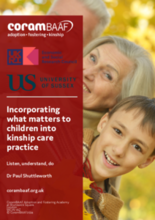This kinship care practice guidance was developed by listening to children's views. It is a practical guide to listening to children living in kinship families to help ensure that their voices and views are heard and acted upon. It is intended primarily for those who support children and families in kinship care arrangements, but it also applies to other areas of child welfare practice. This guidance starts with an explanation of listening and communication methods that can be helpful for meaningfully listening to children in practice. Then, three main themes are highlighted.
Kinship care is a family arrangement in which children are cared for within their family constellation when their previous primary caregivers (typically parents) cannot do so. Based on the 2021 UK census results, it is currently estimated that there are more than 141,000 children living in kinship care arrangements. Most children are cared for by their grandparents in informal kinship care— i.e., without formal, ongoing statutory involvement.
The quotes incorporated into this concise guide are from the research and the more detailed thesis, 'What matters to children living in kinship care?: "another way of being a normal family"'. The original study employed a specific communication method with children: a “What matters” approach. This was designed to help the children discuss and illuminate the values they deem most important for a successful family life. It uses child-led tours, photographs taken by the children, role-play, drawing, and play, all beginning with the simple question: ’What matters to you?’. This approach can be helpful for kinship care and child welfare practice.
Alongside this written guide, a short video has been developed that powerfully illustrates the importance of listening to children.

